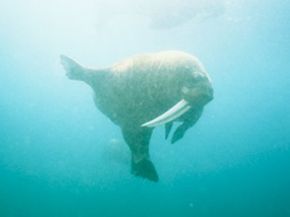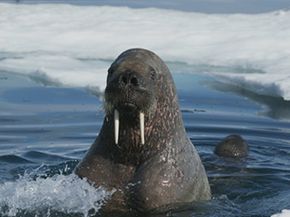Quck answer
Walruses sleep in the water by floating on the surface, keeping their heads above water to breathe. They can do this because they have a special reflex that allows them to stay buoyant and their bodies are adapted to withstand cold temperatures. Additionally, they have a unique ability to shut off one side of their brain at a time, allowing them to rest while still remaining alert to potential dangers in their environment.
Wild Animals

Walruses are known for their grace underwater, where they can swim at speeds of up to 22 mph (35 kph) and stay submerged for more than 10 minutes thanks to their well-tuned circulatory systems. Their bodies are also hardy enough to withstand frigid arctic waters as low as -31 degrees Fahrenheit (-35 degrees Celsius). However, what sets them apart is their ability to sleep underwater without drowning. This is particularly impressive given that they mate, give birth, and nurse their young in the water.
Walruses use pharyngeal pouches located on either side of their esophagus as flotation devices. Essentially, these expandable pockets can hold up to 13 gallons (50 liters) of air, allowing the walruses to bob up and down vertically in the water while keeping their heads above water. This position is also used by females while nursing their young. Additionally, the pouches prevent water from entering the animals’ mouths when they dive underwater, but they are not inflated during dives.
It’s amazing to think about the many activities that walruses can perform in the water, with sleeping being just one of them. If only humans could sleep underwater as easily as walruses do!
Pharyngeal Pouches: Walrus Water Beds

Aside from being used as flotation devices, pharyngeal pouches also help male walruses produce their characteristic bell-like sounds and serenade potential mates.
Walruses use their tusks to anchor themselves onto ice floes and prevent drifting away. These animals have few predators and are not usually at risk of being eaten while they sleep. If a predator did attack, the water would be the walrus’s best chance of escape. To learn more about walruses, check out the links provided on the next page. These include related articles on how walruses function, as well as quizzes and additional resources. Various sources have been consulted to gather information on these fascinating creatures, including MarineBio.org, SeaWorld, and the Arctic Studies Center.
FAQ
1. How long can walruses hold their breath?
Walruses are capable of holding their breath for up to 30 minutes. This is possible due to their ability to slow down their heart rate and divert blood flow from non-essential organs to the brain and heart.
2. Do walruses sleep in the water?
Yes, walruses can sleep in the water. They can float on the surface with their heads and flippers resting on ice floes or they can sleep underwater by wedging themselves between rocks.
3. How do walruses sleep underwater?
Walruses can sleep underwater by slowing down their metabolism and heart rate. They are able to hold their breath for long periods of time and can remain motionless on the sea floor for up to 5 minutes.
4. Can walruses drown while sleeping in the water?
It is possible for walruses to drown while sleeping in the water if they are unable to surface for air due to entanglement in fishing nets or other debris. However, this is a rare occurrence.
5. Do walruses sleep in groups or alone?
Walruses typically sleep in groups on ice floes or on land. However, they may also sleep alone while floating in the water or wedged between rocks.
6. How do walruses avoid predators while sleeping in the water?
Walruses are able to sleep with one eye open and one hemisphere of their brain awake, allowing them to remain alert for potential predators. They may also form groups for protection while sleeping.
7. Do walruses snore while sleeping?
There is no evidence to suggest that walruses snore while sleeping.
8. How do walruses communicate while sleeping?
Walruses may make low grunts or snorts while sleeping, but they primarily communicate through vocalizations and body language while awake.
9. Do walruses dream while sleeping?
There is no way to know for sure if walruses dream while sleeping, but it is possible since they have a complex brain and experience REM sleep.
10. Can walruses sleep while swimming?
Walruses are capable of sleeping while swimming, but they typically prefer to sleep while floating on the surface or wedged between rocks.
11. How much sleep do walruses need?
Walruses do not have a set amount of sleep they require, but they may sleep for several hours at a time throughout the day and night.
12. Do walruses sleep more during certain times of the year?
Walruses may sleep more during the winter months when there is less daylight and colder temperatures. They may also sleep more after feeding, as digestion can make them feel lethargic.





Leave a Reply